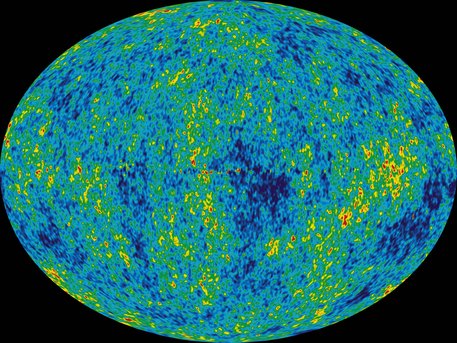Posted by Alexandru Nicolae
 |
| Image Credit: NASA/ WMAP team. |
The current evidence states that the Big Bang that occurred 13.7 billion years ago gave rise to a universe that is constantly expanding, cooling, growing. As it does this it loses energy; at one point it will have lost all its energy resulting in a permanently cold and energy-less universe: a heat death.
Conformal cyclic cosmology (CCC) is a relatively new theory coined by Professor Roger Penrose, a theoretical physicist at Oxford University, that proposes the existence and structure of the big bang (the beginning of our very universe) is actually the continuum of a remote future of a previous age of the universe.
A new "aeon", a term created by professor Penrose, would be the time between successive Big Bang events. The universe would explode into being, expand, and then contract into a singularity, only to be repeated once again: a cyclic universe.
Some of the professor's theories are incredibly interesting to read, some recapping and suggesting astronomical physics which I have never even read about: massless particles lacking a passage of time, the universe "forgetting" time in the remote future, black holes evaporating and taking away a portion of the universe's energy with it...its absolutely mind-boggling to read!
The theory is in stark contrast to some other leading models of the universe, namely ones of constantly expanding or constantly contracting, one-time-existence universes.
It is grounded on many prior, and extremely complicated and baffling, physics principles including the ever elusive dark matter. I'm so far removed from their explanation I won't even bother trying; however, you can try understanding the science behind it yourself here. Best of luck to you!
Despite the complexities, professors R. Penrose and V.G. Gurzadyan (of the Yerevan Physics Institute, Armenia) working in conjunction have found evidence that may actually support CCC.
They studied something called cosmic microwave background (CMB) radiation; radiation that permeates space constantly and uniformly. Left over from the very beginning of the universe. The current theory being that past galaxy collisions (ones that occurred in the pre-big bang aeon) would have an observable effect on our current universe's CMB. If we could measure these effects somehow, they could potentially support CCC theory.
According to CCC, the collision of the centres of these galaxies (black holes really), would release large amounts of energies that effect the current CMB, showing up as non-random, concentric circles of very low temperature variations.
Seven years was spent on collecting background radiation data. It was analyzed and was shown to contain various concentric circles, areas in the universe containing exactly the low temperature variations sought out: glimpses into colliding galaxies of a past aeon. The concentric circles found may be at odds with current theories stating that CMB is random. A heated debate may ensue on just exactly what this all means.
Despite the shear magnitude and implications of the research, it's still all very premature and requires much more extensive studies. On top of the basics of science, the theory is also quite controversial and many of the assumptions made by the authors are also in dispute by other theoretical physicists.
If proven right, however, the implications could be explosive for the Big Bang theory (pardon the awful pun). It could completely revolutionize how we view our universe, or even our very lives depending on how we take the news. I'll do my best to keep you all updated on any new developments in this story, because it's one that definitely doesn't disappoint.
References:
Physicsworld.com. Penrose claims to have glimpsed universe before Big Bang. Link.
Gurzadyan VG, Penrose R. (2010). Concentric circles in WMAP data may provide evidence of violent pre-Big-Bang activity. arXiv:1011.3706v1 [astro-ph.CO]. Link
Penrose R. (2006). Before the Big Bang: An Outrageous New Perspective and Its Implication for Particle Physics. Proc EPAC. 09, 03 :2759-2762
Palmer J. 2010, Nov 27. Cosmos may show echoes of events before Big Bang. BBC News.
Link.

What caused the Big Bang? What triggered it? And do we have any idea what was going on prior the Big Bang? Yes, there is a new idea, the answer about what was going on prior to the Big Bang, why the Big Bang happened and what was the reason?
ReplyDeleteAccording to the new hypothesis, the geometric interpretation of the Lorentz’s radical says that the Big Bang happened in an incredible way. If the speed of light in the universe is maximal, a new hypothesis explains that the Big Bang is the cause of the collision of galaxies with the speed of light.
Many theories suggest that when the intergalactic speed reaches the speed of light, then the universe is maximally expanded. But a new hypothesis about the universe talks back. When we think that the universe is maximally expanded, it is actually maximally compressed, the galaxies are in a singular state and at this moment they collide with the speed of light. The Big Bang is a result of the collision of galaxies with the speed of light.
This is not mentioned in any theory of the Big Bang yet. This is an extraordinary idea with the proof.
Ref: google.com – “ Релятивистская механика пространства времени разума “